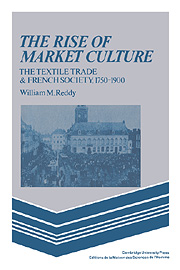Book contents
- Frontmatter
- Contents
- List of figures and maps
- List of abbreviations
- Preface
- Introduction
- Part One A world without entrepreneurs, 1750–1815
- Part Two Uses of the market idea, 1816–1851
- Part Three Unquestioned assumptions, 1852–1904
- 8 The clock time of the Second Empire
- 9 The moral sense of farce
- 10 Little insurrections
- Conclusion
- Notes
- Bibliographical note
- Index
8 - The clock time of the Second Empire
from Part Three - Unquestioned assumptions, 1852–1904
Published online by Cambridge University Press: 30 September 2009
- Frontmatter
- Contents
- List of figures and maps
- List of abbreviations
- Preface
- Introduction
- Part One A world without entrepreneurs, 1750–1815
- Part Two Uses of the market idea, 1816–1851
- Part Three Unquestioned assumptions, 1852–1904
- 8 The clock time of the Second Empire
- 9 The moral sense of farce
- 10 Little insurrections
- Conclusion
- Notes
- Bibliographical note
- Index
Summary
Under the Second Empire textile laborers learned arithmetic. They had little choice in the matter. On the one hand a prolonged and unprecedented boom stimulated a series of technical changes in the industry that entailed continuous reorganization of tasks and recalculation of pay rates. On the other hand, the regime barred all forms of public protest during its first 12 years and, while legalizing strikes after 1864, continued to forbid trade organizations of any kind and even assemblies of over 20 persons. It remained impossible to meet, to plan, to picket, to demonstrate, to delegate. Opportunities for the expression of fundamental dissatisfaction with the regime or the social order were nonexistent. Laborers found that resistance was most successful when confined to narrow, local, detailed concerns. The boom meant that owners had room to make concessions on pay, and laborers found that they did make concessions when pressed hard enough, provided that the demands were formulated strictly with reference to the specific pay conditions involved. Laborers learned to use the notions of time and effort to advantage, to bargain for the first time over the terms of sale of labor, instead of yarn and cloth. But this new facility did not blot out the old yearnings.
LIBERALISM BY DECREE
The government found it necessary to arrest over twenty-seven thousand individuals when Napoleon seized power in December 1851. Resistance had been fierce, if sporadic. The new regime was under no illusions as to its survivability without the use of force and, with disturbing rapidity, instituted a thoroughgoing police state.
- Type
- Chapter
- Information
- The Rise of Market CultureThe Textile Trade and French Society, 1750–1900, pp. 227 - 252Publisher: Cambridge University PressPrint publication year: 1984



